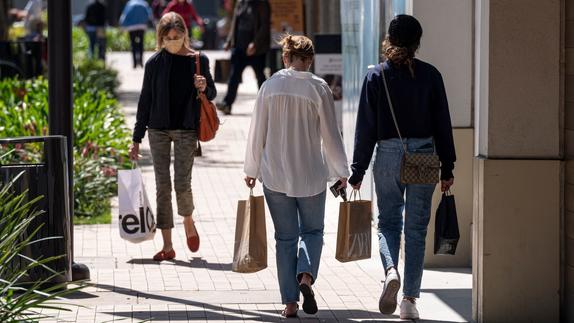 In this file photo taken on April 14, 2021, shoppers wearing protective masks carry bags in the Broadway Plaza Shopping Center in Walnut Creek, California, US. (PHOTO / BLOOMBERG)
In this file photo taken on April 14, 2021, shoppers wearing protective masks carry bags in the Broadway Plaza Shopping Center in Walnut Creek, California, US. (PHOTO / BLOOMBERG)
UNITED NATIONS - Approximately two-thirds of households with children have witnessed falling incomes since the COVID-19 pandemic hit two years ago, according to a joint report released by the UN Children's Fund and the World Bank on Wednesday.
Presenting findings from data collected in 35 countries, the report "Impact of COVID-19 on the welfare of households with children" notes that households with three or more children were most likely to have come up short, with more than three-quarters experiencing a reduction in earnings.
ALSO READ: UN chief denounces unequal COVID-19 vaccine distribution
Presenting findings from data collected in 35 countries, the report "Impact of COVID-19 on the welfare of households with children" notes that households with three or more children were most likely to have come up short, with more than three-quarters experiencing a reduction in earnings
"Families cannot afford food or essential healthcare services. They cannot afford housing. It is a dire picture, and the poorest households are being pushed even deeper in poverty," said Sanjay Wijesekera, UNICEF director of Programme Group.
According to the joint press release, the lost earnings have left adults in one-quarter of households without enough money to feed their children.
Moreover, adults in nearly half of households with children reported skipping a meal due to a lack of money.
"Families have experienced loss at a staggering scale. While last year, inflation reached its highest level in years, more than two thirds of households with children brought in less money," Wijesekera added.
According to recent data, children and families are most likely to be hit by the economic crisis caused by COVID-19.
The number of children living in multidimensional poverty - without access to education, health, housing, nutrition, sanitation or water - soared to approximately 1.2 billion in 2020, while an estimated additional 100 million children were projected to have fallen into multidimensional poverty in 2021.
ALSO READ: WSJ: US probes options trade on Microsoft-Activision deal
According to the report, with 40 percent of households not engaging in any educational activities while their schools are closed, children are deprived of the basics.
"The disruptions to education and healthcare for children, coupled with catastrophic out-of-pocket health expenses which affect more than one billion people, could put the brakes on the development of human capital - the levels of education, health and well-being people need to become productive members of society," said Carolina Sanchez-Paramo, global director of Poverty and Equity for the World Bank.
The report also notes that prior to COVID-19, one in six children worldwide - or 356 million - experienced extreme poverty, where household members struggled to survive on less than $1.90 a day.
More than 40 percent of children lived in moderate poverty. And nearly one billion children lived in multidimensional poverty in developing countries, a figure that has since increased by 10 percent due to the pandemic.
ALSO READ: UN calls for halt to‘use of force’
UNICEF and the World Bank are calling for a rapid expansion of social protection systems for children and their families.


